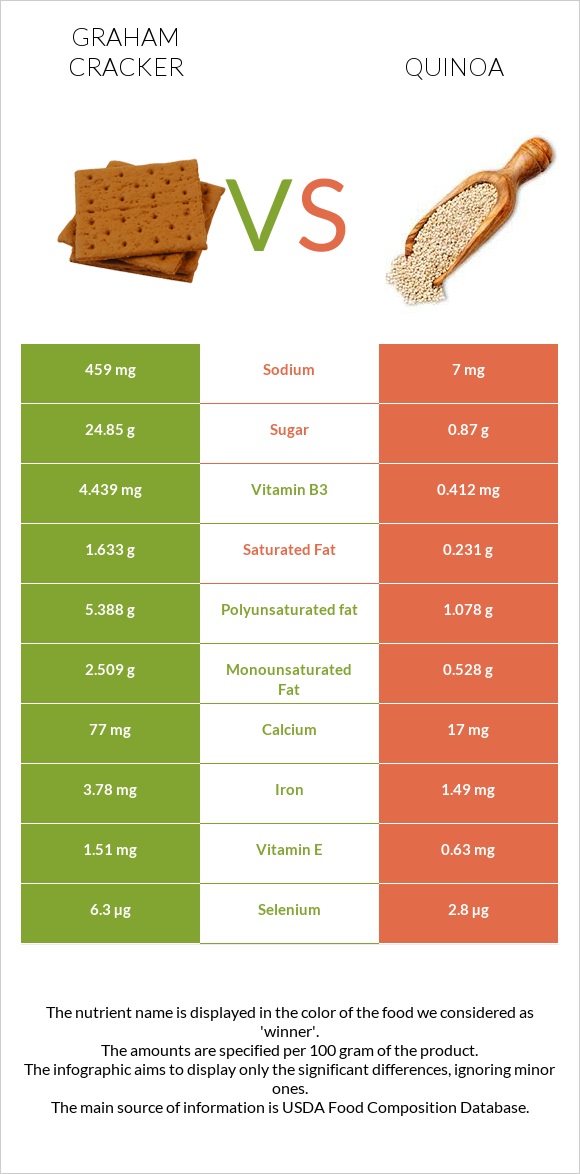Graham cracker vs. Quinoa — In-Depth Nutrition Comparison
Compare
Significant differences between graham cracker and quinoa
- The amount of iron, vitamin B3, manganese, vitamin B2, vitamin B1, folate, vitamin K, and selenium in graham cracker is higher than in quinoa.
- Graham cracker covers your daily iron needs 29% more than quinoa.
- Quinoa contains less sodium.
- Graham cracker has a higher glycemic index. The glycemic index of graham cracker is 74, while the glycemic index of quinoa is 53.
Specific food types used in this comparison are Cookies, graham crackers, plain or honey (includes cinnamon) and Quinoa, cooked.
Infographic

Infographic link
Mineral Comparison
Mineral comparison score is based on the number of minerals by which one or the other food is richer. The "coverage" charts below show how much of the daily needs can be covered by 300 grams of the food.
| Contains more CalciumCalcium | +352.9% |
| Contains more IronIron | +153.7% |
| Contains more PhosphorusPhosphorus | +21.7% |
| Contains more ManganeseManganese | +61.5% |
| Contains more SeleniumSelenium | +125% |
| Contains more MagnesiumMagnesium | +60% |
| Contains more CopperCopper | +12.9% |
| Contains more ZincZinc | +13.5% |
| Contains less SodiumSodium | -98.5% |
Vitamin Comparison
Vitamin comparison score is based on the number of vitamins by which one or the other food is richer. The "coverage" charts below show how much of the daily needs can be covered by 300 grams of the food.
| Contains more Vitamin EVitamin E | +139.7% |
| Contains more Vitamin B1Vitamin B1 | +147.7% |
| Contains more Vitamin B2Vitamin B2 | +188.2% |
| Contains more Vitamin B3Vitamin B3 | +977.4% |
| Contains more Vitamin B5Vitamin B5 | +∞% |
| Contains more Vitamin B6Vitamin B6 | +26.8% |
| Contains more Vitamin KVitamin K | +∞% |
| Contains more FolateFolate | +116.7% |
All nutrients comparison - raw data values
| Nutrient |  |
 |
DV% diff. |
| Iron | 3.78mg | 1.49mg | 29% |
| Polyunsaturated fat | 5.388g | 1.078g | 29% |
| Vitamin B3 | 4.439mg | 0.412mg | 25% |
| Sodium | 459mg | 7mg | 20% |
| Carbs | 77.66g | 21.3g | 19% |
| Manganese | 1.019mg | 0.631mg | 17% |
| Calories | 430kcal | 120kcal | 16% |
| Vitamin B2 | 0.317mg | 0.11mg | 16% |
| Fats | 10.6g | 1.92g | 13% |
| Vitamin B1 | 0.265mg | 0.107mg | 13% |
| Starch | 46.56g | 17.63g | 12% |
| Vitamin K | 14.3µg | 0µg | 12% |
| Folate | 91µg | 42µg | 12% |
| Vitamin B5 | 0.42mg | 8% | |
| Magnesium | 40mg | 64mg | 6% |
| Calcium | 77mg | 17mg | 6% |
| Vitamin E | 1.51mg | 0.63mg | 6% |
| Selenium | 6.3µg | 2.8µg | 6% |
| Saturated fat | 1.633g | 0.231g | 6% |
| Protein | 6.69g | 4.4g | 5% |
| Phosphorus | 185mg | 152mg | 5% |
| Monounsaturated fat | 2.509g | 0.528g | 5% |
| Vitamin B6 | 0.156mg | 0.123mg | 3% |
| Choline | 5.9mg | 23mg | 3% |
| Fiber | 3.4g | 2.8g | 2% |
| Copper | 0.17mg | 0.192mg | 2% |
| Zinc | 0.96mg | 1.09mg | 1% |
| Fructose | 0.99g | 1% | |
| Net carbs | 74.26g | 18.5g | N/A |
| Potassium | 170mg | 172mg | 0% |
| Sugar | 24.85g | 0.87g | N/A |
| Trans fat | 0.055g | N/A | |
| Tryptophan | 0.052mg | 0% | |
| Threonine | 0.131mg | 0% | |
| Isoleucine | 0.157mg | 0% | |
| Leucine | 0.261mg | 0% | |
| Lysine | 0.239mg | 0% | |
| Methionine | 0.096mg | 0% | |
| Phenylalanine | 0.185mg | 0% | |
| Valine | 0.185mg | 0% | |
| Histidine | 0.127mg | 0% | |
| Omega-3 - DHA | 0g | 0.015g | N/A |
| Omega-3 - ALA | 0.599g | N/A | |
| Omega-6 - Gamma-linoleic acid | 0.024g | N/A | |
| Omega-6 - Eicosadienoic acid | 0.004g | N/A | |
| Omega-6 - Linoleic acid | 4.735g | N/A |
Macronutrient Comparison
Macronutrient breakdown side-by-side comparison
Protein:
6.69 g
Fats:
10.6 g
Carbs:
77.66 g
Water:
3.39 g
Other:
1.66 g
Protein:
4.4 g
Fats:
1.92 g
Carbs:
21.3 g
Water:
71.61 g
Other:
0.77 g
| Contains more ProteinProtein | +52% |
| Contains more FatsFats | +452.1% |
| Contains more CarbsCarbs | +264.6% |
| Contains more OtherOther | +115.6% |
| Contains more WaterWater | +2012.4% |
Fat Type Comparison
Fat type breakdown side-by-side comparison
Saturated fat:
Sat. Fat
1.633 g
Monounsaturated fat:
Mono. Fat
2.509 g
Polyunsaturated fat:
Poly. Fat
5.388 g
Saturated fat:
Sat. Fat
0.231 g
Monounsaturated fat:
Mono. Fat
0.528 g
Polyunsaturated fat:
Poly. Fat
1.078 g
| Contains more Mono. FatMonounsaturated fat | +375.2% |
| Contains more Poly. FatPolyunsaturated fat | +399.8% |
| Contains less Sat. FatSaturated fat | -85.9% |
Carbohydrate type comparison
Carbohydrate type breakdown side-by-side comparison
Starch:
46.56 g
Sucrose:
22.82 g
Glucose:
1.04 g
Fructose:
0.99 g
Lactose:
0 g
Maltose:
0 g
Galactose:
0 g
Starch:
17.63 g
Sucrose:
0 g
Glucose:
0 g
Fructose:
0 g
Lactose:
0 g
Maltose:
0 g
Galactose:
0 g
| Contains more StarchStarch | +164.1% |
| Contains more SucroseSucrose | +∞% |
| Contains more GlucoseGlucose | +∞% |
| Contains more FructoseFructose | +∞% |
~equal in
Lactose
~0g
~equal in
Maltose
~0g
~equal in
Galactose
~0g





